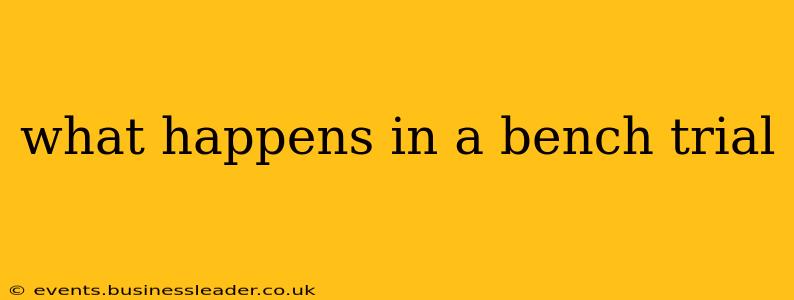A bench trial, unlike a jury trial, is a trial where the judge acts as both the finder of fact and the arbiter of law. This means the judge, not a jury, decides the outcome of the case based on the evidence presented. This article will delve into the intricacies of a bench trial, answering common questions and providing a comprehensive understanding of this legal procedure.
What is a Bench Trial?
A bench trial is a trial conducted before a judge without a jury. The judge hears evidence, assesses witness credibility, and ultimately renders a verdict. This process is often preferred in cases involving complex legal issues or where the judge's expertise is deemed crucial for a fair and just outcome. It can also be a more efficient and cost-effective alternative to a jury trial, particularly in simpler cases.
How Does a Bench Trial Differ From a Jury Trial?
The key difference lies in who decides the case. In a jury trial, a group of citizens (the jury) hears the evidence and determines the facts, while the judge instructs them on the applicable law. In a bench trial, the judge assumes both roles, acting as both the jury and the judge. This means the judge evaluates the evidence, assesses witness credibility, and applies the law to reach a verdict.
Who Decides if a Case Will Be a Bench Trial or a Jury Trial?
The decision of whether to have a bench trial or a jury trial generally rests with the defendant (the person or entity being sued). In criminal cases, the defendant has the right to a jury trial. In civil cases, both the plaintiff (the person or entity bringing the suit) and the defendant generally have the option to choose a bench trial or a jury trial. However, specific rules and procedures may vary depending on the jurisdiction and the type of case.
What Happens During a Bench Trial?
A bench trial proceeds much like a jury trial, albeit without a jury. The following stages are typically involved:
- Opening Statements: Both sides present opening statements summarizing their case and outlining the evidence they intend to present.
- Presentation of Evidence: Each side presents their evidence, which may include witness testimony, documents, and physical evidence. The judge rules on the admissibility of evidence.
- Cross-Examination: Each side has the opportunity to cross-examine the other side's witnesses.
- Closing Arguments: After the presentation of evidence, both sides present closing arguments summarizing their case and arguing why they should prevail.
- Judge's Ruling: The judge considers all the evidence presented and renders a verdict. In civil cases, this verdict may include monetary damages or other remedies. In criminal cases, it will be a verdict of guilty or not guilty.
What are the Advantages of a Bench Trial?
- Efficiency: Bench trials are often quicker and less expensive than jury trials.
- Expertise: The judge is typically more knowledgeable about the law than a jury.
- Reduced Jury Selection: The process avoids the time and effort involved in selecting a jury.
- Privacy: Some parties may prefer the confidentiality of a bench trial over the public nature of a jury trial.
What are the Disadvantages of a Bench Trial?
- Impartiality Concerns: There's a potential concern that the judge may be biased, although judges are trained to be impartial.
- Limited Perspective: The judge's perspective may be narrower than that of a jury, which brings diverse experiences and viewpoints.
- No "Common Sense" Check: A jury may provide a common-sense check on legal complexities that a judge may overlook.
- Appeal: Appealing a bench trial decision might be more challenging as it is entirely based on the judge’s legal interpretation.
Is a Bench Trial Right for My Case?
The decision of whether to opt for a bench trial versus a jury trial is a significant strategic choice. Consult with an attorney to determine the best course of action based on your specific circumstances and the nature of your case. The attorney will weigh the potential advantages and disadvantages specific to your situation, including the complexity of the legal issues, the strength of your evidence, and the perceived biases of the judge presiding over the case. It is crucial to make this decision in consultation with a legal professional who understands the nuances of your jurisdiction and the specific case at hand.
